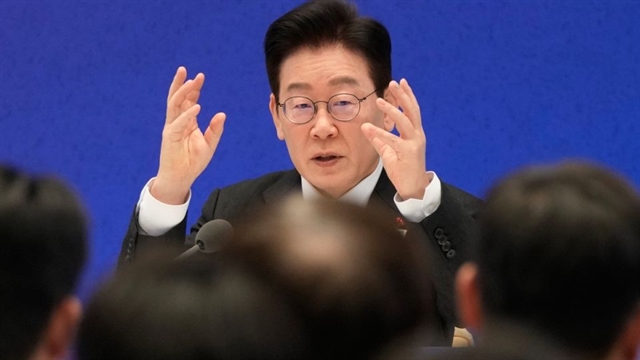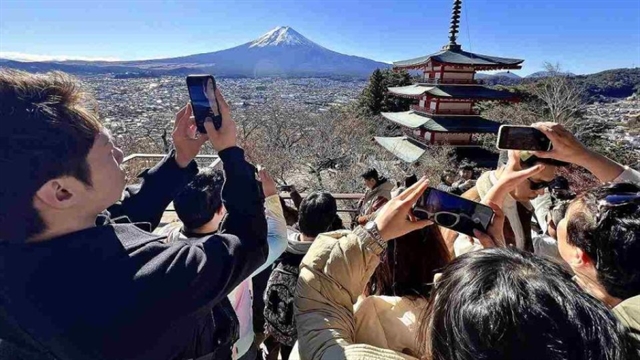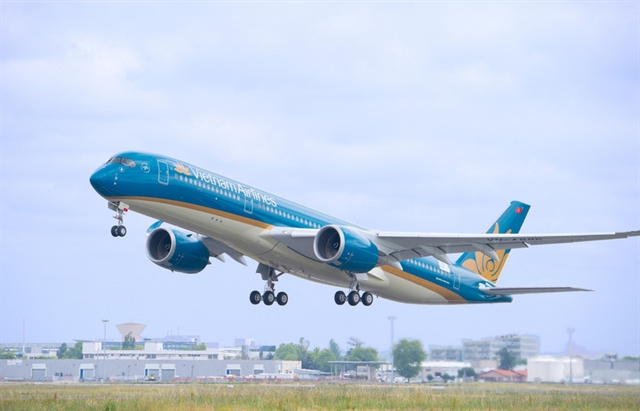 World
World

 |
| A large number of foreign tourists gather at Arakurayama Sengen Park in Fujiyoshida, Yamanashi Prefecture, on Monday to take pictures of the snowcapped Mt. Fuji. PHOTO: THE YOMIURI SHIMBUN |
TOKYO – Overtourism is becoming more serious in the municipalities in the northern foothills of Mt. Fuji, which has finally been crowned with snow for this year. Many foreign tourists are flooding into the area, trying to take pictures of the spectacular scenery. Traffic congestion and littering have also worsened, and local governments are working on countermeasures, but lacking radical solutions, those in charge are severely frustrated.
On Monday morning, a 54-year-old tourist from India was in Arakurayama Sengen Park in Fujiyoshida, Yamanashi Prefecture, enthusiastically snapping pictures with her smartphone. She said she felt very lucky to get to see the beauty of snowcapped Mt. Fuji, and that this was what she had hoped for in making her first visit to Japan.
The park has become popular for its panoramic view of Mt. Fuji and the five-story pagoda. Although the fall foliage season is over, the observation deck was overflowing with tourists taking pictures, making it difficult for people to move.
The park, located in a quiet residential area, used to be a place for residents to relax. But the spectacular view became a hot topic on social media, resulting in a flood of tourists. In addition to littering and trespassing on private property, the park is plagued by chronic traffic jams, regardless of day or time.
The total number of visitors to the park between April and the end of November this year was a record 1.02 million, with 147,151 in November, an increase of 10,000 from the same month last year and a record high for that month. If the number of visitors continues to increase at the current pace, it is expected to exceed the previous fiscal year’s total of 1.3 million. In December, the city plans to allocate about ¥19 million in a supplementary budget plan to add more traffic wardens.
In addition, a total of eight parking lots, including temporary ones, have been opened in the surrounding area, but no improvement has been seen. A city official says that finding a fundamental solution is difficult.
The cost of countermeasures has continued to balloon, with about ¥80 million spent last fiscal year on traffic guides and restroom cleaning among others. “It is possible that the amount will increase further this fiscal year,” said one city official.
This situation is not limited to the park.
At the Lawson convenience store in Fuji-Kawaguchiko, Yamanashi Prefecture, which previously became a topic of discussion as a hot spot for photographing Mt. Fuji, people are once again starting to gather and, according to the town, constantly crossing the road unsafely.
In addition, on the Fujikyu Railway line which runs at the foot of Mt. Fuji, people have often been observed entering the tracks from railroad crossings to take pictures of the snow-capped Mt. Fuji.
The company has installed warning signs and a device that automatically plays warning sounds near railroad crossings. A representative of the company said, “This is very dangerous, and we want them to stop it. We will continue to warn them about it.”
The village of Yamanakako, Yamanashi Prefecture, which opened an observation deck on Nov. 20 that offers a panoramic view of Mt. Fuji, Lake Yamanakako and the mountains at the foot of Mt. Fuji, has posted security guards on weekends and holidays to prevent traffic jams. A shuttle bus service from a remote parking lot has also begun operating on a trial basis.
An official at the village’s tourism department said, “There have been concerns about overtourism due to the spectacular scenery. So we took steps immediately after the opening of the deck to prevent problems such as traffic accidents.” THE JAPAN NEWS/ANN




